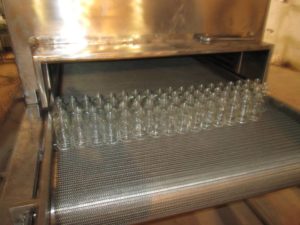 Glass is a solid-like and transparent material that is used in numerous applications in our daily lives. It is a sustainable, fully recyclable material which provides great environmental benefits such as contributing to mitigating climate change and saving precious natural resources. It is also highly appreciated in many applications for its inert nature and its contributions to safeguarding people’s health ad well being. It is an unlimited material whose number of applications is constantly evolving and which is more and more used in combination with other material for high-tech applications.
Glass is a solid-like and transparent material that is used in numerous applications in our daily lives. It is a sustainable, fully recyclable material which provides great environmental benefits such as contributing to mitigating climate change and saving precious natural resources. It is also highly appreciated in many applications for its inert nature and its contributions to safeguarding people’s health ad well being. It is an unlimited material whose number of applications is constantly evolving and which is more and more used in combination with other material for high-tech applications.
Glass processing is energy intensive, therefore the possibility to reduce energy consumption by selective energy intake into portions of glass using microwave heating is investigated. Glass products like bottles, jars, windows, mirrors, tableware, automobile parts etc. are some of the most commonly produced. Microwave heating is a process whereby microwave rays produced by magnetrons are directed toward reactants or heating medium, which absorb the electromagnetic energy volumetrically to achieve self-heating uniformly and rapidly. Microwaves obey the laws of optics-they are transmitted, reflected or absorbed depending on the nature of materials.
Strong absorption of the radiation was achieved by preheating the glasses, or by the application of microwave absorbing coatings, or by hydration. Experiments in melting, refining, reheating for forming, thermal toughening and surface ion exchange showed that the principal advantage of microwave radiation is rapidity of heating and a capability to heat hot areas of the glass selectively while leaving the cooler areas unaffected. Control of the uniformity and rate of heating were the principal difficulties which were overcome in due course of time. And the industrial microwave proved to be a better energy source for heating glass because it is easily controllable, is able to heat glass volumetrically or exclusively (as required by the specific task), and provides very high efficiency.
The use of microwave (MW) radiation in glass processing is reviewed and compared to the usual processing techniques –
- Melting – of various raw materials in appropriate proportion at an elevated temperature and removal of impurities to get a homogenous melt.
- Forming – permits molten glass to be shaped into flat sheets and filaments by controlling the viscosity. The most common types of glass forming be –
1: Flat glass
2: Glass fibers
3: Continuous glass fibers
4: Glass tubing
5: Toughened or tempered glass
6: Laminated Glass - Annealing – of the molten glass after setting into desired shapes
- Inspection & testing – performed after the manufacturing process to ensure the quality level of the product is within acceptable standards.
- Secondary Processing – Applying of special coatings or labeling
MW heating is known as a much-faster process (requiring minutes rather than hours), yielding good product quality, in comparison with the prolonged conventional thermal treatment of glass precursors.
Shedding some light on the characteristics of Microwave heating:
There are some characteristics of microwave heating that other heating methods (conventional heating method) do not have the following –
- Internal heating
- Rapid heating, Selective heating
- High heating efficiency, Rapid response and temperature control
- Heating uniformity, Clean energy
- Good working and operating environment
Why choose us?
Since the last 42 years, KERONE has been designing, manufacturing and installing machinery, power sourced by microwave, infrared, radio frequency and convection radiation for all types of industries including Glass. Accuracy, efficiency, machine quality and output quality are not just words but KERONE’s lifetime commitment towards our profession since its inception, creating a base of more than 1000 loyal customers. Our microwave heating systems are used to meet the varying demands of numerous industrial applications – all with a level of precision that manufacturers seek. Fulfilling demands as per client’s specification has been our USP and we strive to carry the same forward. We also provide detailed assistance for installation without much hassle of complex functioning of the machinery. We always strive to achieve more than client satisfaction with our timely delivery, quality and efficiency towards every oven manufactured by us.
